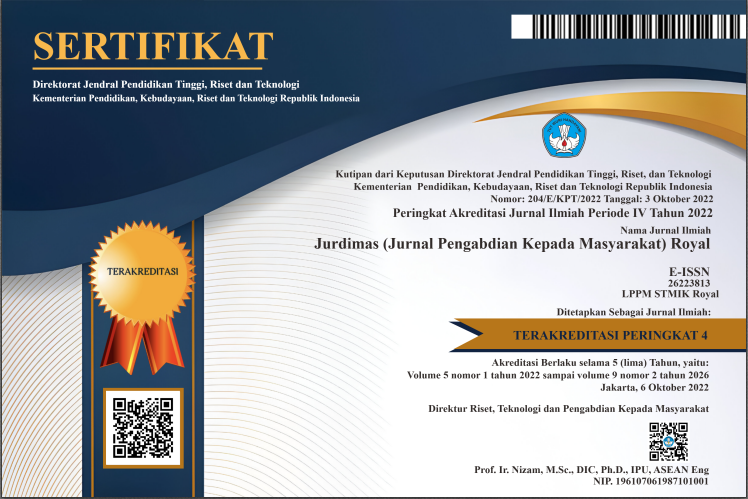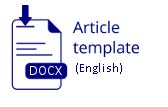BUSINESS STRATEGY USING AI (ARTIFICIAL INTELLIGENCE): MSME TRAINING IN JAYAPURA CITY
Abstract
Abstract: The rapid pace of digital transformation highlights the need to empower Micro, Small, and Medium Enterprises (MSMEs) in Jayapura City by integrating Artificial Intelligence (AI) into their business strategies. This community service initiative aims to assess MSME actors’ initial understanding of AI, deliver targeted training, and evaluate improvements in strategic planning using the Value Proposition Canvas (VPC). The program was conducted in three stages: pre-assessment, training implementation, and post-training evaluation. Initial findings revealed that most participants had limited knowledge of AI and its applications. However, after the training, there was a significant increase in participants’ confidence and capability. The training effectively reduced lack of knowledge by 40%, addressed infrastructure and internet challenges by 45%, and decreased uncertainty regarding AI's return on investment by 30%. Participants began applying tools such as ChatGPT, Canva AI, and the VPC method to better understand customer needs. Although the study was limited by a short evaluation period and a specific geographic focus, it offers valuable insights for policymakers, educators, and development stakeholders. The findings support the importance of accessible, hands-on training in making AI a practical and beneficial resource for small businesses, ultimately promoting inclusive, technology-driven growth.
Keywords: artificial intelligence, business strategy, jayapura, MSME, youth
Abstrak: Transformasi digital yang pesat mendorong perlunya pemberdayaan Usaha Mikro, Kecil, dan Menengah (UMKM) di Kota Jayapura melalui integrasi kecerdasan buatan (AI) dalam strategi bisnis mereka. Program pengabdian masyarakat ini bertujuan untuk menilai pemahaman awal pelaku UMKM terhadap AI, memberikan pelatihan terarah, dan mengevaluasi peningkatan dalam perencanaan strategis menggunakan Value Proposition Canvas (VPC). Kegiatan ini dilaksanakan dalam tiga tahap: pra-asesmen, pelatihan, dan evaluasi pascapelatihan. Hasil awal menunjukkan bahwa mayoritas peserta memiliki pengetahuan terbatas tentang AI dan penerapannya. Namun, pascapelatihan terlihat peningkatan signifikan dalam kepercayaan diri dan kemampuan peserta. Pelatihan berhasil menurunkan tingkat ketidaktahuan sebesar 40%, mengurangi kendala infrastruktur dan internet sebesar 45%, serta menekan keraguan atas keuntungan penggunaan AI sebesar 30%. Peserta mulai memanfaatkan alat seperti ChatGPT, Canva AI, dan metode VPC untuk meningkatkan pemahaman kebutuhan pelanggan. Meski terbatas pada waktu evaluasi yang singkat dan wilayah Jayapura, studi ini memberikan wawasan penting bagi pembuat kebijakan, pendidik, dan pemangku kepentingan untuk mendorong pertumbuhan UMKM berbasis teknologi secara inklusif.
Kata kunci: anak muda, bisnis strategi, jayapura, kecerdasan buatan, UMKM
References
Bhalerao, K., Kumar, A., Kumar, A., & Pujari, P. (2022). A Study of Barriers and benefits of Artificial Intelligence Adoption In Small and Medium Enterprise. Academy of Marketing Studies Journal, 26. https://www.abacademies.org/articles/a-study-of-barriers-and-benefits-of-artificial-intelligence-adoption-in-small-and-medium-enterprise-13409.html
Fajri, F., Perdana, K. A., Manurung, D. U., Dharmawan, P. K. N., & Dewi, N. G. (2025). The role of early adoption of artificial intelligence in supporting the growth of micro and Ultra-Micro enterprises in Indonesia: challenges and opportunities. Jurnal Akuntansi Dan Bisnis, 10(02), 133. https://doi.org/10.47686/jab.v10i02.744
Hendrawan, S. A., Chatra, N. A., Iman, N. N., Hidayatullah, N. S., & Suprayitno, N. D. (2024). Digital Transformation in MSMEs: Challenges and opportunities in technology management. Jurnal Informasi Dan Teknologi, 141–149. https://doi.org/10.60083/jidt.v6i2.551
Instagram. (n.d.). https://www.instagram.com/p/DJ-ZpHYT8PQ/?igsh=Mm55bmQ4YjZhZ3E3
Laupichler, M. C., Aster, A., Perschewski, J., & Schleiss, J. (2023). Evaluating AI Courses: A Valid and Reliable Instrument for Assessing Artificial-Intelligence Learning through Comparative Self-Assessment. Education Sciences, 13(10), 978. https://doi.org/10.3390/educsci13100978
Rachmiani, R., Haidar Ahmada, N., & Darusman, D. (2025). Optimization of Digital Technol-ogy Utilization in Marketing Strategy Development to Enhance the Competitiveness of MSME Products. International Journal of Management Science and Infor-mation Technology, 5(1), 56–66. https://doi.org/10.35870/ijmsit.v5i1.3648
Rodríguez, A. A., & Calvario, G. (2024, August). Value Proposition Design with Artificial Intelligence: A Methodology for Business Model Innovation. In 2024 Portland International Conference on Management of Engineering and Technology (PICMET) (pp. 1-6). https://doi.org/10.23919/picmet64035.2024.10653454
Santosa, A. D., & Surgawati, I. (2024). Artificial Intelligence (AI) Adoption as Marketing Tools among Micro, Small, and Medium Enterprises (MSMEs) in Indonesia. Jurnal Sosial Humaniora (JSH), 17(1), 91-102. https://doi.org/10.12962/j24433527.v17i1.20520
Somisu, R. P. (2023). Pengaruh Kepribadian, Lingkungan dan Ketersediaan Informasi Kewirausahaan terhadap Minat Berwirausaha Anak Muda di Kota Jayapura. Accounting Profession Journal (APAJI), 5(2), 179-185. https://doi.org/10.35593/apaji.v5i2.108
Sutrisno, S., Permana, R., & Junaidi, A. (2023). Education and training as a means of developing msme expertise. Journal of Contemporary Administration and Management (Adman), 1(3), 137-143. https://doi.org/10.61100/adman.v1i3.62
WONG, J. and Yap, K. (2024). Factors influencing the adoption of artifi-cial intelligence in accounting among micro, small medium en-terprises (msmes). Quantum Jour-nal of Social Sciences and Hu-manities, 5(1), 16-28. https://doi.org/10.55197/qjssh.v5i1.323














